Getting a radiant complexion might be easier than you think. The key often lines in the best vitamins for skin glow. These vitamins can change how you look.
Knowing which vitamins help your skin can boost your natural beauty. This lets you pick the right supplements and foods for your skin. It makes a big difference in how your skin looks and feels.
With the right nutrients, you can not only glow but also have healthier skin.
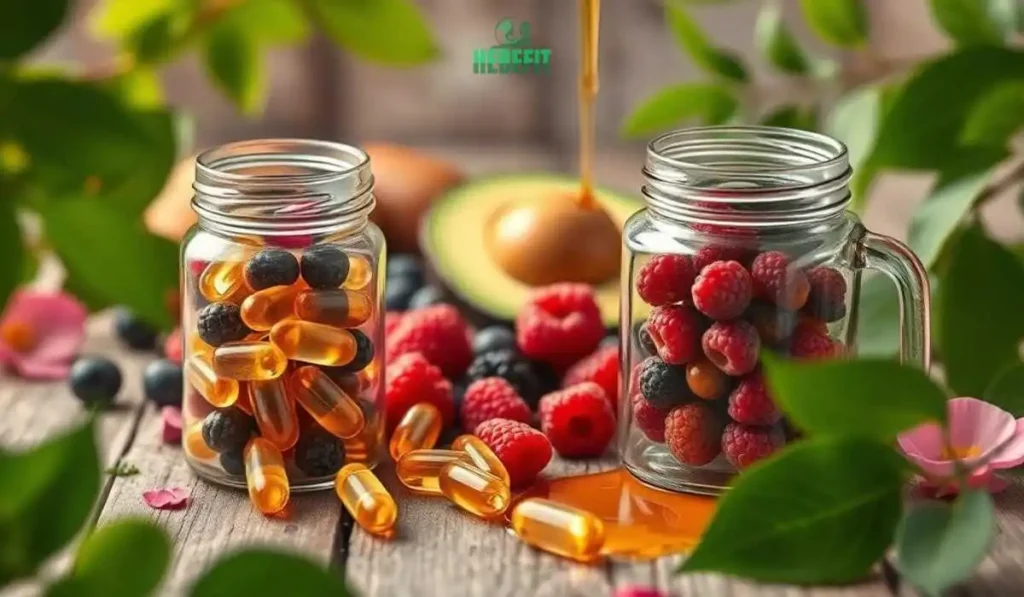
Key Takeaways
- The right combination of vitamins can enhance your skin’s natural glow.
- Vitamins play a critical role in maintaining overall skin health.
- Natural supplements can effectively support your skincare routine.
- Nutrition is essential for achieving skin glow and whitening.
- Understanding which vitamins benefit your skin is key to a radiant complexion.
Understanding Skin Health
Keeping your skin healthy starts with what you eat. Vitamins are key to a balanced diet. They help your skin look and feel its best. Without the right nutrients, your skin might become dry, dull or age too quickly.
The Role of Nutrition in Skin Health
Your diet greatly affects your skin. Vitamins like Vitamin C brighten your skin and boost collagen. Vitamin E protects your skin from harm.
Eating foods full of these vitamins can make your skin shine. It’s all about choosing the best vitamins for radiant skin.
How Skin Changes with Age
As you get older, your skin changes a lot. It loses elasticity, gets lines, and may not look even. This can make your skin look different.
It’s more important to eat vitamins for healthy skin as you age. Vitamins A, C and E help repair and glow your skin. They keep your skin looking young and healthy.

Why Vitamins are Essential for Skin Glow
Understanding vitamins is key to better skin health. They help with cell renewal, keeping skin hydrated and smooth. Adding the right vitamins to your daily routine can boost your look and confidence.
The Impact of Vitamins on Skin Function
Vitamins are vital for skin health. Vitamin C brightens and evens skin tone. It also boosts collagen, keeping skin elastic.
Vitamin E fights off free radicals, preventing early aging. Both are top choices for glowing skin.
Common Signs of Vitamin Deficiency
Knowing vitamin deficiency signs is important. Look out for dry skin, dull look, or more spots. Checking for these signs helps keep your skin healthy and bright.

| Vitamin | Role in Skin Health | Signs of Deficiency |
| Vitamin C | Brightens skin, boosts collagen | Dry skin, rough patches |
| Vitamin E | Protects from oxidative stress | Dull skin, increased pigmentation |
| Vitamin A | Supports cell renewal, improves texture | Flaky skin, signs of aging |
| B Vitamins | Enhances metabolism and hydration | Redness, irritation |
Best Vitamins for Skin Glow
Certain vitamins are key for radiant skin. Knowing their benefits helps pick the right ones. Adding these to your diet or skincare can boost your skin health.
Vitamin C: The Brightening Agent
Vitamin C boosts collagen, keeping skin firm and elastic. It lightens dark spots, giving you a brighter skin tone. As an antioxidant, it fights off skin damage, making your skin look better.
Vitamin E: The Powerful Antioxidant
Vitamin E protects skin from pollution and UV rays. It keeps skin moist, fighting dryness. Taking vitamin E regularly keeps your skin looking young and healthy.
Vitamin A: The Skin Regenerator
Vitamin A is vital for skin renewal. It reduces wrinkles, making your skin look younger. It also improves skin texture and tone, keeping it glowing.
B Vitamins: The Energy Boosters for Your Skin
B vitamins, especially B3 and B5, boost energy and moisture. They strengthen the skin barrier, improving hydration and reducing irritation. Adding B vitamins keeps your skin vibrant and strong.
Food Sources of Skin-Boosting Vitamins
Getting your skin to glow from the inside is key. Foods are full of vitamins that help your skin look great. Fruits and veggies are especially good for your skin and health.
Fruits and Vegetables Rich in Vitamins
Eating a variety of fruits and vegetables for skin health is smart. They give you important vitamins. Here are some great options:
- Oranges – Full of Vitamin C, they make your skin brighter and help with collagen.
- Spinach – It’s loaded with Vitamin A, which helps your skin cells grow and renew.
- Carrots – Rich in beta-carotene, which turns into Vitamin A and keeps your skin flexible.
- Blueberries – They’re full of antioxidants that fight aging.
- Avocados – They have healthy fats and Vitamin E, great for keeping your skin moist and healthy.
Supplements vs. Whole Foods
While best supplements for glowing skin can help, they can’t replace real food. Studies show that eating whole foods gives you more benefits than supplements. This is because your body absorbs nutrients better from food, thanks to fiber and antioxidants.
How to Incorporate Vitamins into Your Skincare Routine
Adding vitamins to your skincare routine can make your skin look better and stay healthy. It’s important to use both topical products and choose the right ones. This way, you can get the most out of the best vitamin C serum and vitamin E supplement.
Topical Applications of Vitamins
Using vitamins in serums and creams targets your skin’s needs. Vitamin C brightens your skin, making it essential. Vitamin E keeps your skin moist and elastic. Choose products based on your skin type. Light serums work well for oily skin, while dry skin needs richer creams.
Choosing the Right Skincare Products
When picking products for glowing skin, check the ingredients and how they’re made. Look for high vitamin C and E content. Choose products that fit your skin’s needs, like hydration or anti-aging. Brands like SkinCeuticals and The Ordinary are known for quality. Making smart choices helps your skincare routine work best.
Additional Tips for Radiant Skin
For radiant skin, you need to think about more than just vitamins. Hydration and sun protection are key. Drinking enough water makes your skin look plump and young. Also, protecting your skin from the sun keeps it healthy and prevents damage.
The Importance of Hydration
Hydration is vital for your skin. Drinking water daily keeps your skin elastic and reduces fine lines. Hydrated skin glows and fights off environmental stress better. Using products like hyaluronic acid can help too.
Sun Protection and Its Role in Skin Health
Using sunscreen is essential for sun protection. UV rays can cause early aging and damage. A broad-spectrum sunscreen applied regularly can prevent these problems. Remember, UV rays can also lead to dark spots and wrinkles, making sun protection a must.
| Benefit | Hydration | Sun Protection |
| Skin Elasticity | Improves | No Effect |
| Appearance of Fine Lines | Reduces | No Effect |
| Skin Tone Evenness | Enhances | Prevents Dark Spots |
| Risk of Skin Cancer | No Effect | Reduces Risk |
Following these tips for radiant skin can greatly improve your look. Stay hydrated and protect your skin from the sun for that glowing complexion you want.
Consulting Professionals for Skin Advice
Getting professional advice for your skin is key to keeping it healthy. A dermatologist knows a lot about skin problems and can give you advice that fits you. Knowing when to go to a dermatologist can stop small skin issues from getting worse.
It’s important to know when you need expert help for your skin. This is crucial for anyone serious about their skin’s health.
When to See a Dermatologist
See a dermatologist if you have:
- Persistent acne that doesn’t get better with over-the-counter treatments
- Changes in skin color or unusual moles
- Chronic skin conditions like eczema or psoriasis
- Signs of infection, redness, or swelling
- Dermatitis that gets worse or doesn’t get better
These situations need special care and advice. Knowing when to see a dermatologist helps you take care of your skin better.
Creating a Personalized Skincare Plan
A personalized skincare plan is crucial for reaching your skin goals. A dermatologist can help pick the right products and routine for you. Important things to talk about include:
| Parameter | Professional Input | Your Preferences |
| Skin Type | Identifying if your skin is oily, dry, combination, or sensitive | Your daily skincare habits and any known sensitivities |
| Skin Concerns | Understanding conditions such as acne, aging, or pigmentation | Your aesthetic preferences and concerns about skin appearance |
| Product Recommendations | Suggesting targeted treatments and suitable ingredients | Individual choices regarding cruelty-free or natural products |
Working together, you’ll get expert advice and the power to manage your skincare. Tailoring your skincare plan can lead to healthier and brighter skin.
Final Thoughts
When looking for the best vitamins for skin glow, remember to eat well and take care of your skin. The right vitamins are key to making your skin look and feel great. Vitamins C, E, A and B vitamins help a lot, brightening your skin and fighting off damage.
It’s smart to make your diet and skincare fit your skin’s needs. This way, you can see big improvements. Don’t forget, getting glowing skin is about more than just vitamins. It’s also about staying hydrated and protecting your skin from the sun.
In short, adding the best vitamins for skin glow to your daily routine is a smart move. It’s all about good nutrition and tailoring your skincare to your skin’s needs. This way, you can get skin that shows off your health and energy.
FAQ
What are the best vitamins for skin glow?
Vitamins C, E, A, and B are great for glowing skin. Vitamin C brightens, Vitamin E is an antioxidant, Vitamin A regenerates skin, and B Vitamins boost energy and health.
How do vitamins affect skin health?
Vitamins are key for skin health. They help with cell growth, keeping skin hydrated, and fighting aging signs. Taking the right vitamins can make your skin look better.
Can supplements help with skin glow?
Yes, supplements like collagen, omega-3 fatty acids, and certain vitamins can make your skin glow. They improve hydration, elasticity, and reduce wrinkles.
What vitamins are effective for reducing dark spots?
Vitamins C and E are great for fading dark spots. They brighten the skin and combat oxidative stress.
Are there any vitamins for acne-prone skin?
Yes, Vitamin B3 (niacinamide), Zinc, and Omega-3 fatty acids are good for acne-prone skin. They reduce inflammation and control oil.
How can I incorporate vitamins into my skincare routine?
Add vitamins to your skincare with serums and creams. Look for products with Vitamin C, E, or retinol. Taking oral supplements also helps from the inside.
What foods are rich in skin-boosting vitamins?
Eat foods like citrus fruits for Vitamin C, nuts and seeds for Vitamin E, and orange veggies for Vitamin A. Whole grains are good for B Vitamins.
Is hydration important for skin glow?
Yes, hydration is crucial for skin glow. Drinking enough water keeps your skin elastic and radiant.
What are some signs of vitamin deficiency affecting skin appearance?
Signs of vitamin deficiency include dry, dull skin, more wrinkles, and acne or irritation.
How often should I take vitamins for skin glow?
How often to take vitamins depends on the type and dosage. Always follow the supplement’s instructions or ask a healthcare expert for advice.

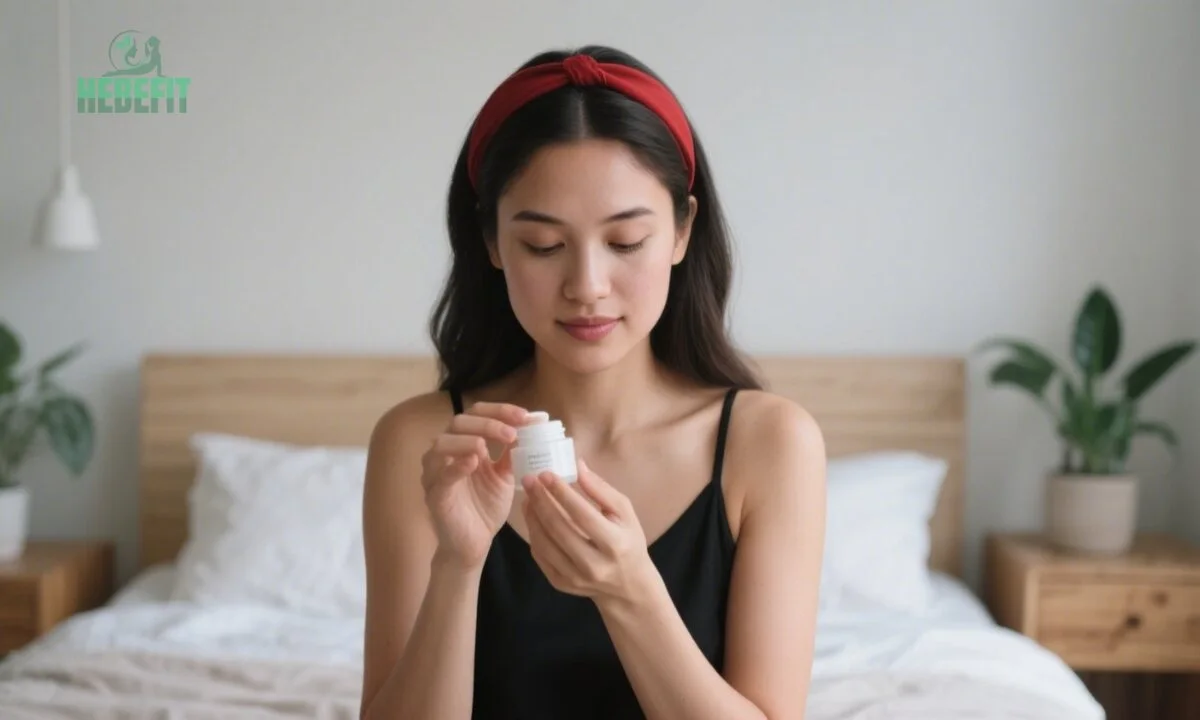
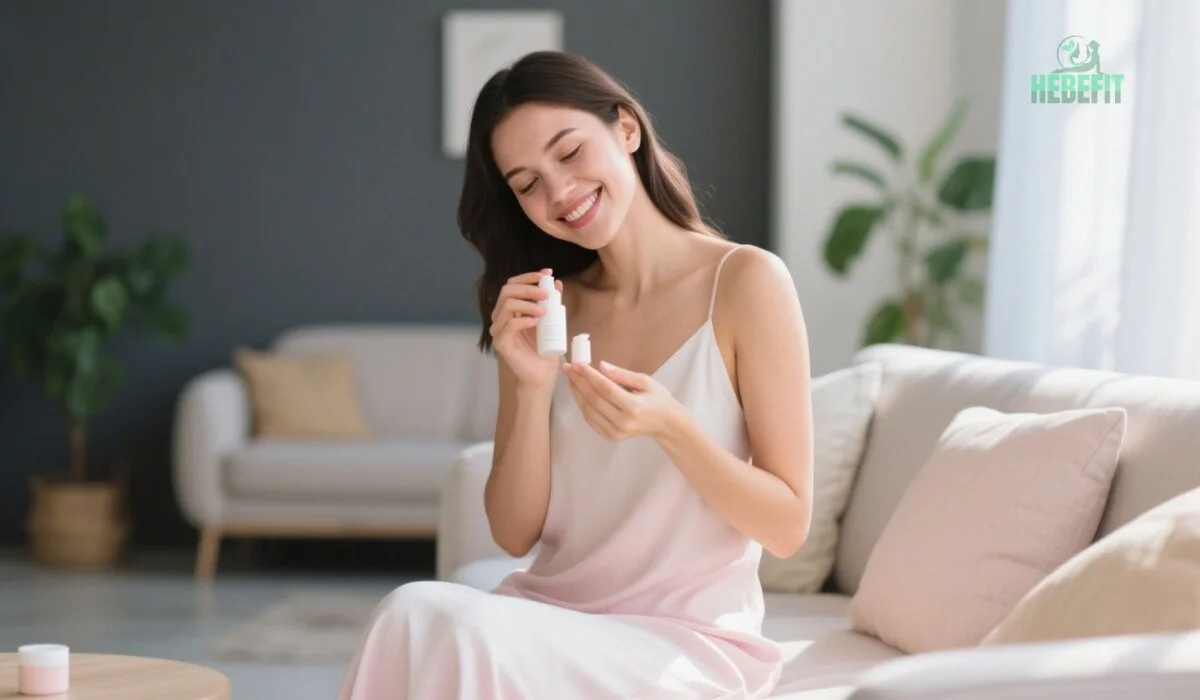
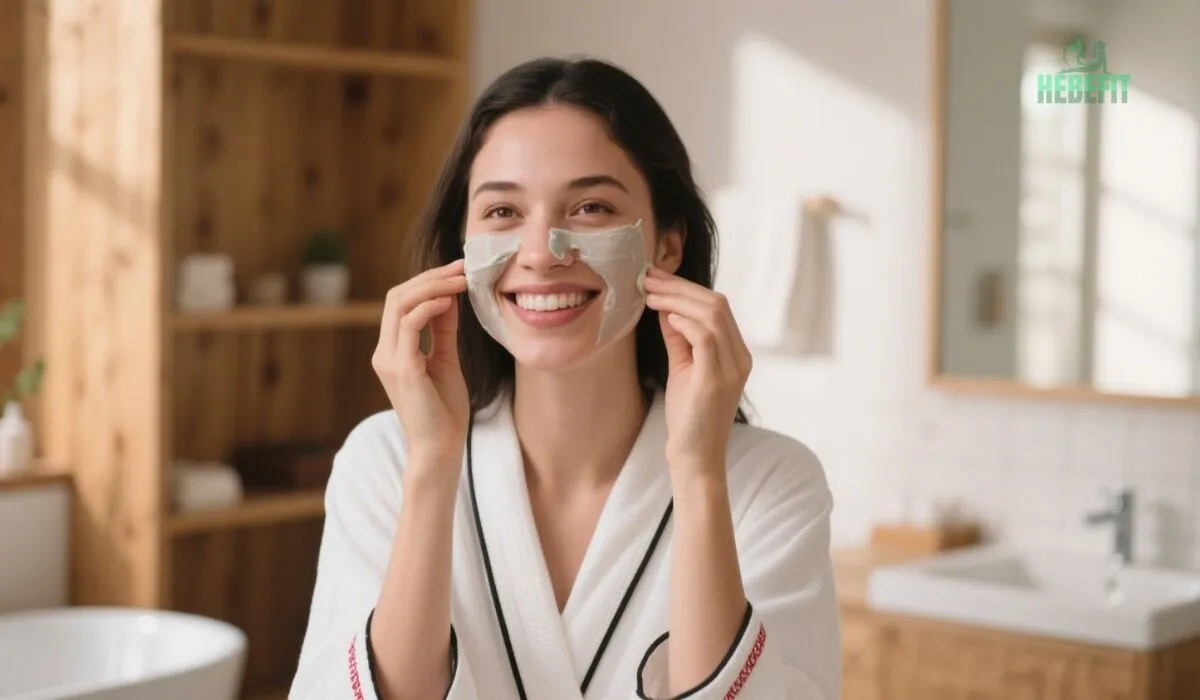

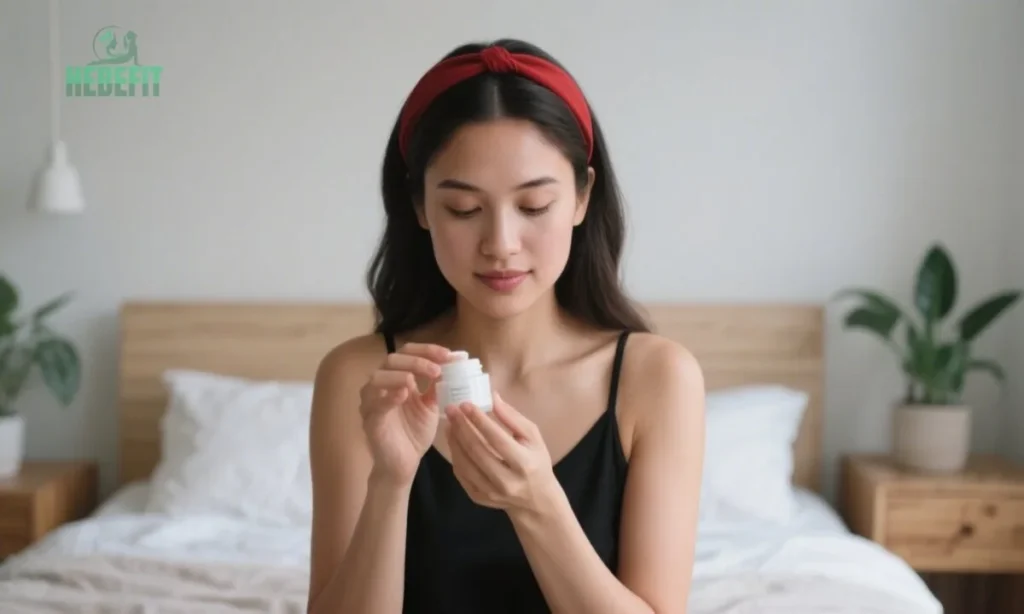
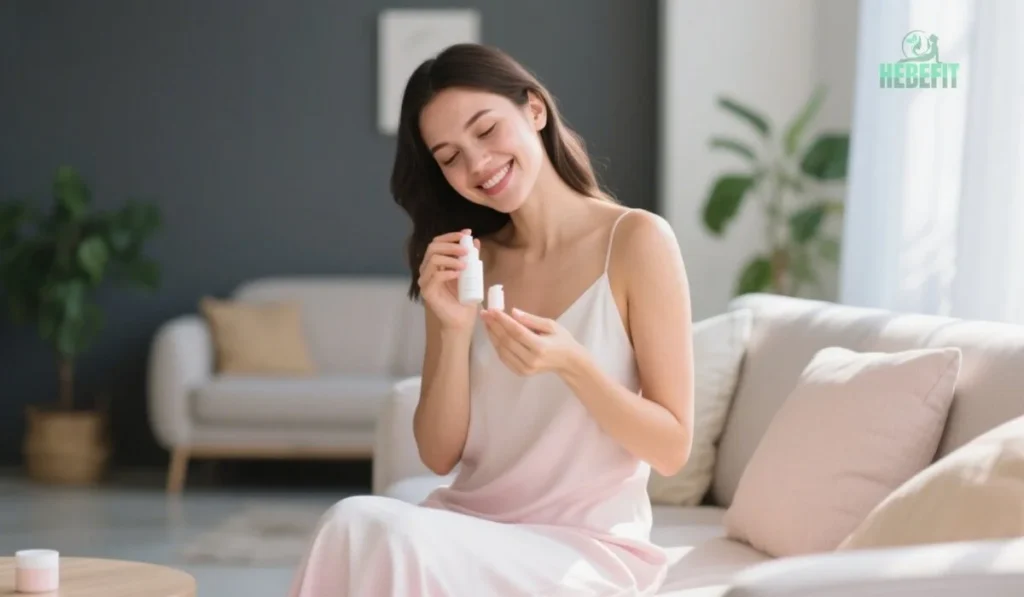
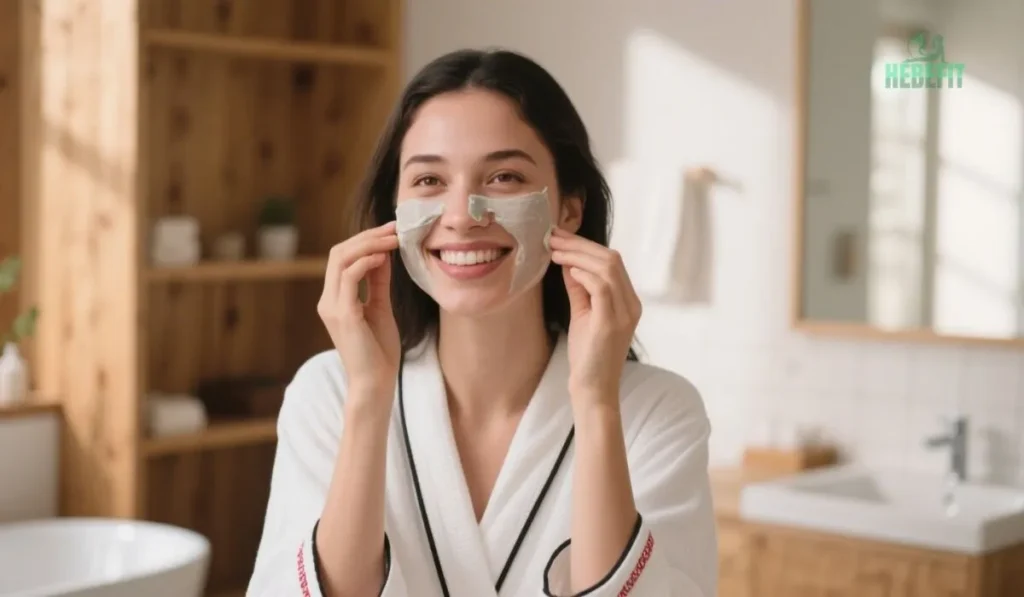



1 thought on “Best Vitamins for Skin Glow”